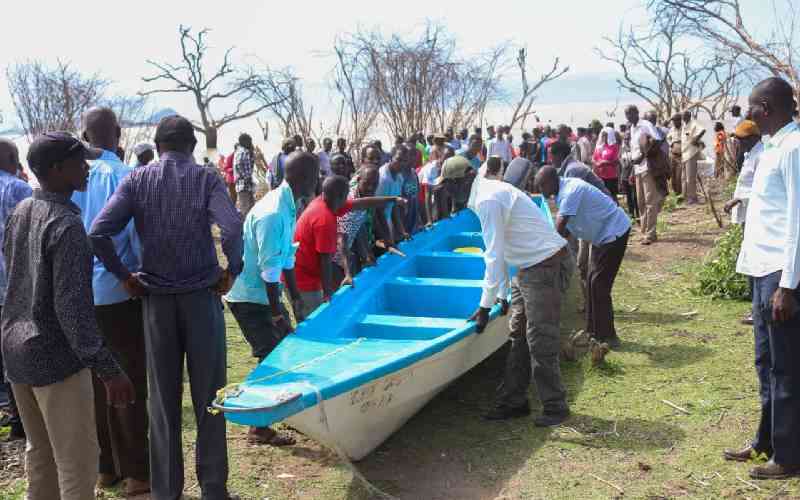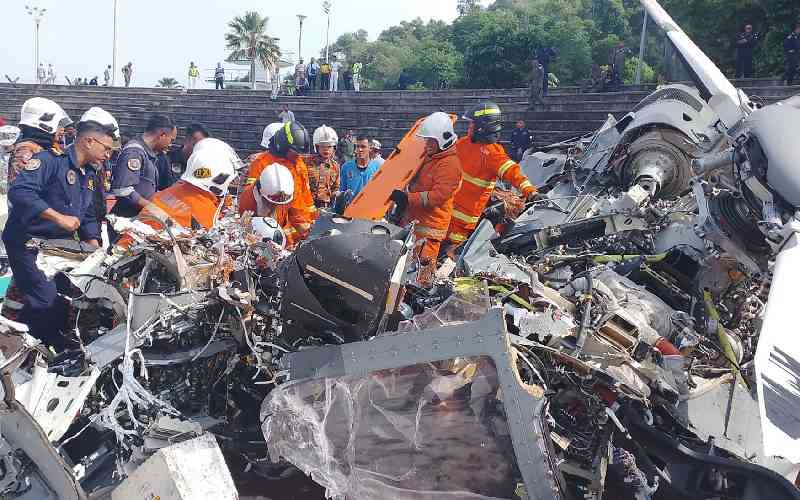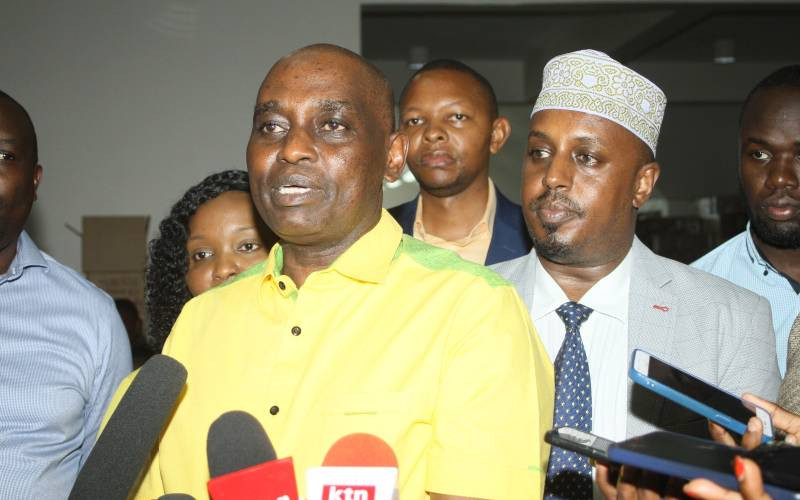By Wahome Thuku
RIFT VALLEY, KENYA: Timothy Kiarie Kimani was employed as a tractor driver by Kapchorua Tea Estate Ltd, a tea growing and processing company in Kenya.
He was transporting green leaf for the company when on October 16, 2003 at around 7.30pm the tractor, a Massey Ferguson collided with a lorry belonging to the Kenya Power and Lighting Company (KPLC) being driven by one Philip Kipkoech Ruto.
Kiarie sustained fractured ribs, a cut, dislocation of the right ankle, and wrist and spine, among other injuries. He was admitted at the Moi Teaching and Referral Hospital in Eldoret for two months. He was discharged on December 17, 2003.
The following year he sued both Kapchorua Tea Estate and KPLC in a magistrate court in Eldoret for damages. After the hearing, the court ruled that Kiarie should shoulder 10 per cent of the blame while Kapchorua Tea Estate was responsible for 30 per cent and KPLC 60 per cent.
It set general damages at Sh950,000 and special damages at Sh1,500. The court also awarded Kiarie the costs of the suit and interest. This meant that Kapchorua Tea was to pay Kiarie Sh285,000 as general damages and KPLC Sh570,000.
Kiarie and the two companies were all dissatisfied with the ruling and each filed an appeal to the High Court separately in 2008.
Consolidated appeals
Kapchorua Tea Estate was the first to appeal against the liability and the amount. Kiarie appealed the following day saying the damages were inadequate.
KPLC appealed against liability and amount. The three appeals were consolidated and went before Lady Justice Philomena Mwilu (now Court of Appeal judge).
According to evidence adduced in the magistrates court, the tractor had one headlight. It was driving uphill and the lorry was going downhill. The road, though tarmacked, was full of potholes. Kiarie said the accident occurred at a slight bend.
The lorry hit his tractor near the driver carrier and also hit the trailer, detaching it off the tractor.
He said he was on the left lane of the road and never lost control of the tractor. He told the court that the lorry was being driven at high speed and hit the tractor even as he tried to avoid the accident.
Kipkoech, however, claimed the tractor was unstable on the road and was being driven in a zigzag manner. He said as he was driving downhill he saw what looked like a motorcycle due to one headlight and did not slow down.
The trailer hit his lorry as they passed. Kipkoech told the court that he thought the tractor was trying to avoid potholes when the collision occurred. He said he was driving at 40 kilometres per hour.
Stay informed. Subscribe to our newsletter
A passenger who was travelling in the lorry, Mr Simeon Abel Mogusu, said the tractor was being driven at high speed and had full light on one of its headlamps. He said the lorry driver applied emergency brakes after the accident.
Dr S I Aduda, who assessed Kiarie’s injuries on May 5, 2004 described them as severe. A second medical examination was undertaken on Kiarie by Dr Z Gaya on February 11, 2008. The detailed medical reports were produced in court.
The High Court judge noted that there was no evidence adduced before the magistrate to the effect that the tractor was defective.
Negligence
“There is nowhere in evidence where Kapchorua Tea Estates was said to have been negligent and therefore the cause of the accident,” Justice Mwilu said. “Its own driver Timothy Kiarie Kimani did not attach any blame to Kapchorua Tea Estates.”
Kiarie had blamed the company in his suit papers but absolved it from blame in his oral evidence.
There was no evidence that the tea company had forced the driver to drive a defective tractor so as to bear the blame for the accident.
Kiarie had not alleged that he was made to work past working hours and hence caused the accident.
“This court is unable to find the evidence as adduced that attributed liability or fault to Kapchorua Tea Estates. To have found the said Kapchorua Tea Estates liable without evidence was a terrible error that the trial court fell into,” Judge Mwilu concluded.
“The above is enough to show that the trial court fell into an error of law and completely misapprehended the evidence and thereby arrived at a decision not supportable in law,” the judge said.
She allowed the appeal by the tea company and substituted the liability with a finding of no liability.
With Kapchorua Tea out of the picture, Mwilu looked at the facts again. The tractor was going uphill at a low speed. The lorry was being driven downhill at high speed.
The judge considered evidence by Kipkoech that he did nothing to avoid the accident; he did not apply brakes or swerve.
In attributing 60 per cent blame to the lorry driver may have shown he played a bigger role in causing the accident than the driver of the tractor who bore 10 per cent liability. That added up to 70 per cent liability for the two drivers. Considering the evidence, the judge held that the lorry driver had to bear the greatest responsibility.
“The trial court’s finding that the tractor driver who was driving uphill was to blame 10 per cent appears reasonable in the circumstances of the case and the trial court was right on that score,” the judge held. She then attributed the other 90 per cent of liability to the KPLC lorry driver.
The appeal by the KPLC against liability was dismissed and substituted with 90 per cent liability.
The judge then looked at the damages awarded by the lower court and after assessing the facts and the extents of the injuries suffered, she substituted the Sh950,000 with an award of Sh600,000 in general damages to Kiarie as a hundred per cent liability.
This meant Kiarie was to shoulder 10 per cent (Sh60,000). KPLC was to pay 90 per cent (Sh540,000), down from the Sh570,000 set by the lower court as general damage.
The court also awarded Kiarie Sh1,500 as special damages plus costs of the suits and interest. In the end Kapchorua Tea went unscathed, while KPLC’s appeal succeeded and the award to Kiarie was lowered in the appeal.
 The Standard Group Plc is a
multi-media organization with investments in media platforms spanning newspaper
print operations, television, radio broadcasting, digital and online services. The
Standard Group is recognized as a leading multi-media house in Kenya with a key
influence in matters of national and international interest.
The Standard Group Plc is a
multi-media organization with investments in media platforms spanning newspaper
print operations, television, radio broadcasting, digital and online services. The
Standard Group is recognized as a leading multi-media house in Kenya with a key
influence in matters of national and international interest.
 The Standard Group Plc is a
multi-media organization with investments in media platforms spanning newspaper
print operations, television, radio broadcasting, digital and online services. The
Standard Group is recognized as a leading multi-media house in Kenya with a key
influence in matters of national and international interest.
The Standard Group Plc is a
multi-media organization with investments in media platforms spanning newspaper
print operations, television, radio broadcasting, digital and online services. The
Standard Group is recognized as a leading multi-media house in Kenya with a key
influence in matters of national and international interest.








